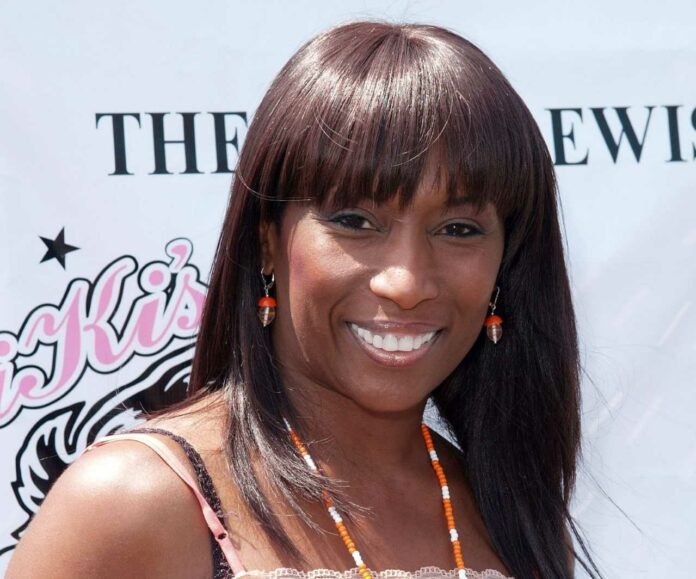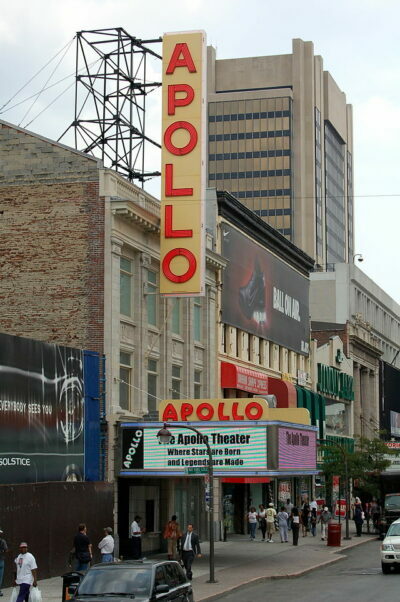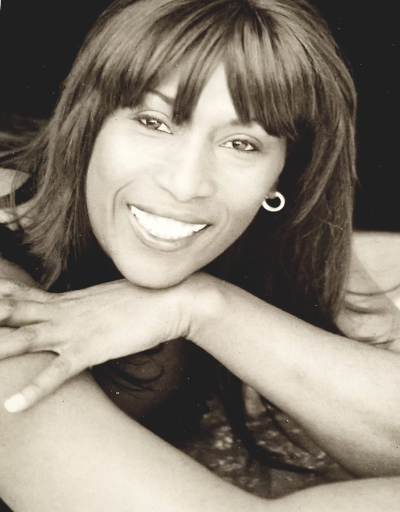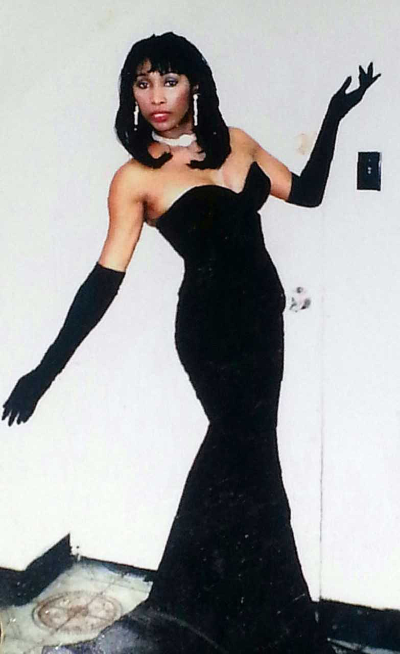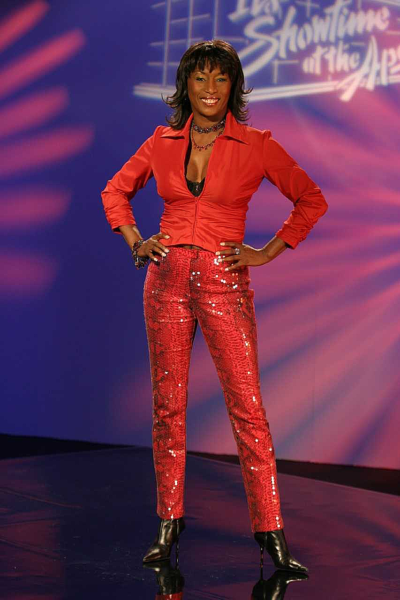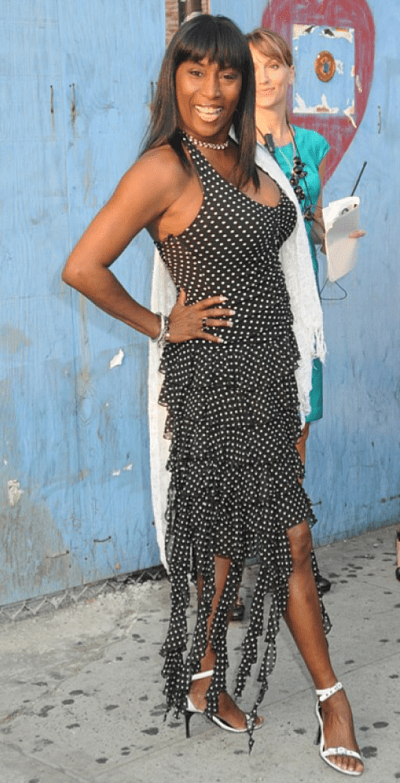Beautiful, vibrant, charming, many will also remember that million dollar smile that KiKi Shepard flashed as we welcomed her every week into our homes as co-host of It’s Showtime at the Apollo. During her 15 years at the legendary Apollo Theater in Harlem where the syndicated historically Black showcase was taped, KiKi has seen it all in front of the camera and behind-the-scenes.
She witnessed how aspiring performers would get booed and heckled by a vociferously demanding audience, then pulled off stage if their performance was less than stellar. If, however, there was a gem amongst the string of acts who garnered the favor of the audience, she also watched that performer be rewarded with wild applause, cash prizes, and a recording contract.
In the once considered capital of the Black entertainment world, KiKi has also worked alongside such comedic hosts as Sinbad, Mark Curry, Steve Harvey, and Rudy Rush.
KiKi is passionate when it comes to all of her life’s creative endeavors but is especially driven when it comes to informing and empowering people about sickle cell disease through her organization, The K.I.S. Foundation. Sickle cell disease (SCD) is a disorder of the red blood cells, which supply oxygen to all the organs. Because SCD occurs in the blood, every organ in the body can be affected. Patients with SCD are at risk for stroke, eye disease, gallstones, serious bacterial infections, and anemia, to name a few. The disease affects 1 out of every 365 Black or African-American births. About 1 in 13 Black or African-American babies is born with sickle cell trait. But African Americans are not the only group affected by the disease, Hispanics, Asians, and Mediterraneans are also affected.
50BOLD sat down with KiKi to discuss her legendary career and current projects.
50BOLD: Okay, silly question, how did you get the name KiKi?
KiKi: (laughs) Ha, that’s a good one! My given name is Chiquita Renee. And my sister and this is a true story, my sister, who is 18 months older than me, got upset because she had to give up her baby bed for me and move to a daybed. She liked her baby bed and wanted me out of it; I was five days old at the time. So she climbed into the baby bed and began pulling on my toes, thinking this would make me leave her bed.
When my mom heard me crying, she came into the room and said: “What’s going on?” Of course, my mom discovered what my sister had been doing. My mom then tried to get my sister to say, “I’m sorry, Chiquita,” but she was only 18 months old, and couldn’t pronounce my name, so instead, she called me “Titi or Chi Chi.” And so my name Chiquita morphed into KiKi, a kind of shortcut (laughs).
50BOLD: You’re an actress, TV host, and dancer, so which profession did you enjoy the most, and what did you get out of doing it?
KiKi: I would have to say, probably hosting was my favorite profession. Dancing was my original choice. I loved to dance ever since I could remember. I then went into acting and loved this as well. Hosting was very special because I was able to really connect with my audience in a completely different way than acting or dancing. There was a one-on-one relationship with whoever you are speaking to at the time, and I really enjoyed this connection.
50BOLD: Out of all of your professions, which was the most challenging for you and why?
KiKi: Acting was the most challenging profession because I had to leave myself to become a character on a written page. I became a new persona with a backstory. It was challenging and exhilarating at the same time actually to transform myself into someone else. Acting classes taught me how to become another person and how not to be afraid to stretch myself. It’s very challenging to find yourself in another space that is not you, the one person you know best. Acting can be very rewarding when you find a way to do it well.
50BOLD: You’re probably best known for being the TV co-host of It’s Showtime at the Apollo. What was it like working at one of New York City’s most iconic theaters?
KiKi: It was all just too amazing! I lived in New York City for about eight or nine years before I started doing the show. I had visited the Apollo Theater previously to enjoy shows. Once I started working on the television show, I became aware of the theater’s long and impressive history and was told fascinating stories about the occurrences there. The theater is truly iconic! I loved being there!
I felt so special every time I walked out onto that stage. I’d look up at the theater’s ceiling, looked to its sides and just imagined all of the great performers who had appeared on the stage. I knew how blessed I was and grateful to be a host on that grand stage. The job of hosting fit me best because of the interaction I had with so many people and for so many years–artists, producers, dancers, comedians, directors, the theater and television audience as well—the interaction with all of these people was truly life-altering!
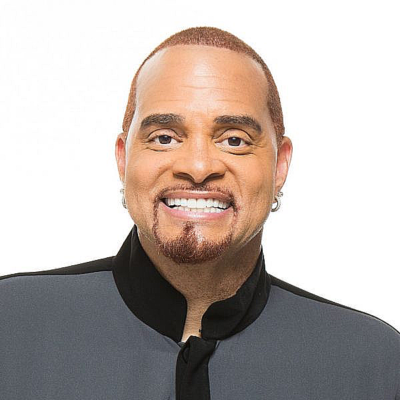
50BOLD: And speaking of hosting It’s Showtime at the Apollo, you had the opportunity to work with three amazing hosts and very talented comedians: Sinbad, Mark Curry, and Steve Harvey.
KiKi: And Rudy Rush! Rudy was the last one!
50BOLD: Yes, Rudy Rush! My apologies.
KiKi: That’s alright!
50BOLD: What was it like working with these four gentlemen?
KiKi: I’ve been asked this question many times, and each one of them contributed in a special way to my experience. Sinbad, of course, established the co-hosting arrangement between the two of us. And the man was so doggone quick-witted, I never knew what was going to come out of his mouth, but this is true of all of them! I really didn’t know what was going to come out of any of their mouths! I just had to be ready and hoped I could maintain some kind of composure because they were all so funny! (laughs) Sinbad was like a brother to me. He was protective of me, never vulgar, never disrespectful; Mark also followed suit.
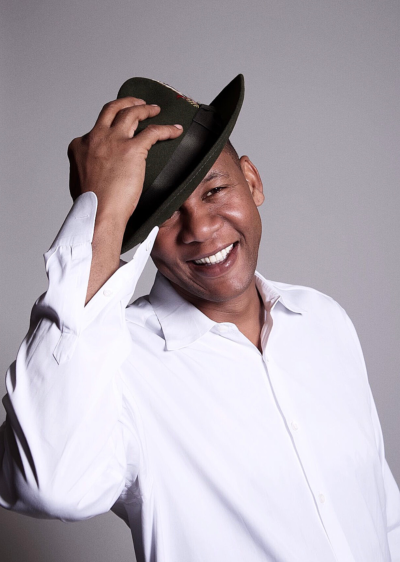
Mark was much younger and was finding himself in his career at the time. Sinbad was a lot more established and knew who he was and what he was doing. For Mark, the Apollo experience was a whole new arena for him, as it was for me, too. And Mark’s time as a host was not as long as Sinbad’s. It was great to hang with Mark because he had a quirky sense of humor. He was like a little brother; Sinbad was like a big brother.
When the show started out, we didn’t know what it was going to be. We didn’t know what people were going to like. We knew the show had different aspects–dancing, performing artists, comedy, Amateur Night—during those first few years, however, we were trying to see what elements would make it a long-lasting platform. Sinbad got the show’s ball rolling, and he put us in a great place. Mark came along and he put his stamp on it.
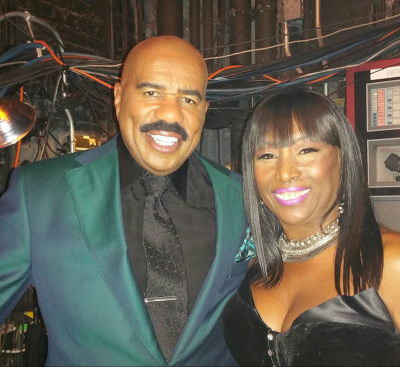
Once Steve came onboard, the show kind of solidified and really became great. The show ran for seven to eight years with Steve and me as co-hosts, and it grew to become very, very successful. Steve was also extremely protective of me. He was a brother but in a different way than Sinbad and Mark has been to me. When Steve entered the picture, as I mentioned, the show grew stronger. It’s Showtime at the Apollo really made him a major star. He was very protective of the Apollo Theater. He was also very protective of what we were presenting. And he was a good friend to me, a really good friend! Steve advised me on the many different ways on how to promote. He helped me and the show to really grow. I have nothing but wonderful things to say about Sinbad, Mark, and Steve.
When Rudy joined the show, we were pretty much well-established and just rolled along for another three years. And like I said with regards to the show, Sinbad started us out, Mark carried it along, Steve established it, and Rudy brought it around full-circle. And I was there through all of it!
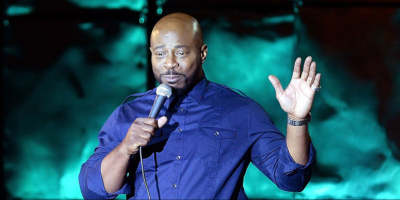
50BOLD: Yes, you were there through it all!
KiKi: (laughs) Yes, I was! And they all had great respect and love for my role. As I stated before, my role grew more and more with each one until I became a co-host of the show. It was an amazing, amazing time for me!
50BOLD: You’ve witnessed disappointment from aspiring performers who just did not make the cut at the Apollo.
KiKi: Do you mean on Amateur Night?
50BOLD: Perhaps.
KiKi: If you were invited to perform at the Apollo, you didn’t get axed. You only got pulled off the stage if you appeared on Amateur Night and were booed by the audience. There were some acts that weren’t good and deserved to get axed. There were some acts that probably should have been allowed to perform a little longer. You have to also remember that the acts were judged by audience applause. If an act was good but didn’t win, it was probably because they didn’t have their crew of fifty in the audience cheering them on and perhaps someone else did.
50BOLD: I remember one performer who appeared on the show, didn’t win, but who did go on to become famous. Ms. Lauryn Hill!
KiKi: Yes, yes, yes! Lauryn Hill, baby! Ms. Lauryn Hill! She was a baby!
50BOLD: Yes, she was!
KiKi: She was maybe 12 or 13-years-old when she appeared on the show singing the Jackson Five’s Who’s Loving You?. Lauryn became very well-known at an early age, like at age 19 or 20, something like that.
50BOLD: Yes, she did!
KiKi: Yep! She didn’t win on the show, but she won in life. Steve was very insistent upon letting folks know that just because they didn’t win on the show, it should not have meant that their dreams were over. I tell young people all the time that they have to take control of their career and work towards what they want. Young people need to understand that even though “No” means “No” for right now, it does not mean this will be a constant for the rest of their lives. I believe that you are in control of your own life. Your path is your own, and it’s determined by your preparation, hard work and proper guidance so that it can be the best; this was my experience.
When I left New York to go to California, I was a dancer. I was warned that being a dancer in California was tough because there were only a certain number of people hired. And I remember saying, “Well, my name is KiKi Shepard and I’m going to give dancing a try in California!” And sure enough, my phone did ring! You really do have to have faith and belief in yourself and in what you have to offer. You simply cannot let other people tell you what you can or cannot do.
50BOLD: Well said! It sounds like faith, and a firm belief in a Higher Power has been a solid foundation for you.
KiKi: Well, of course! I come from Tyler, Texas and I was raised in the Baptist church. We went to church, and so I had a spiritual foundation as a kid. And then I had the real, great fortune of doing a Broadway show called Your Arms Too Short to Box with God. I not only performed it on Broadway twice but I did go on the road tour with Patti LaBelle and Al Green. I did the Biblical-based show for five years every single night, and there was absolutely no way that the Word didn’t infuse into my spirit!
Since I was raised in the church, the Word was already present in me. The show was a great reminder of how God is part of everything that we do, and faith is a belief of those things unseen! In the performing arts industry, there is so much negativity. There are just too many people who will try to knock you down from your balanced space. There is always somebody trying to knock you out of your spot because they want your spot. And you have to have enough faith to understand that you are here for a reason. So if you chose to be a performer, study your craft! Learn your craft! I don’t believe in stepping away from my faith just because I want to be an actress; I’m going to step out on faith! If you don’t step out on faith, this industry will make you feel like you’re not good enough.
I studied hard at my craft. I was an excellent dancer. I came to New York City in the 80s and auditioned for one show, and afterward, I never had to audition, I got called. People would call me for jobs. I worked for ten straight years on Broadway and every year, I was in a show. I am blessed, but I also know I laid the foundation for my craft, so when the opportunities came, I was ready.
50BOLD: Amen!
KiKi: KiKi! (laughs)
50BOLD: (laughs) Do you have a funny story you can share with us involving a performer on It’s Showtime at the Apollo?
KiKi: Well, the funniest story involved this mature woman who had on this breakaway kind of suit. She could not sing very well, and so when she got booed, she turned around, pulled some flaps down on her outfit to expose her behind. She mooned the entire audience!
50BOLD: (laughs) Oooh!
KiKi: (laughs) Oh, God, it was so funny! She was so upset that she had gotten booed! Lord, have mercy! She had to be hustled off stage quickly! Of course, her performance did not air.
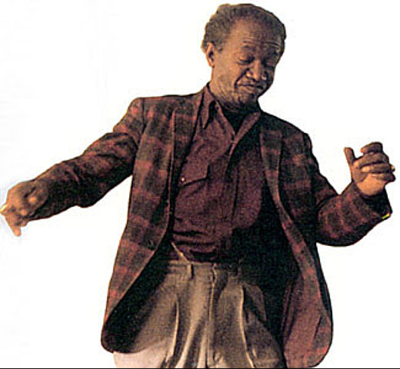
50BOLD: Okay! And speaking of ushering off the stage and also getting back to history, you worked with the late Howard “Sandman” Sims, the Apollo’s beloved executioner who was the theater’s fixture for some 40 years! What was the man who ushered failed acts off stage with a hook or other prop really like?
KiKi: Sandman Sims was a pistol! He was an amazing dancer, a hoofer, a tap dancer. And he went through all the trials and tribulations of being a Black man in this country in the 40s, 50s, and 60s. Sandman had many disappointments in life, but he knew his worth. He knew the value of the Apollo and he did not let anybody disrespect it. As Sandman got older (laughs), he would leave his house to go to the theater, but oftentimes was nowhere to be found. We’d often find ourselves asking, “Where’s Sandman?” And of course, he’d be found somewhere shooting dice on some corner in Harlem.
50BOLD: (laughs)
KiKi: Harlem was his streets! He wasn’t afraid! But as he got older, we had to protect him because he was running around the streets and when the television show aired, he became pretty well-known. We did not want anything to happen to him. Sandman was an icon, but he was also extremely independent. It got to the point where we would have to make sure Sandman got to his house and the theater safely. He loved being on the streets, spreading knowledge and advising young people on what they need to do.
Sandman was such a historian; he knew so much about the theater. He was really Mr. Apollo Theater. I think Sandman once told me how he gave his shoes to James Brown the first time he performed. Something happened with James Brown’s shoes, and Sandman took off his shoes and gave them to him. I do think this is correct.
50BOLD: Okay!
KiKi: Sandman always had interesting stories to tell. He also always had money on him. Chile, Sandman always had a lot of money on him. “Lookie here,” he would always say, “I’m always carryin’! Money, not guns!” (laughs). He was a missile with knowledge and information.
50BOLD: You are involved with spreading the word about sickle cell disease through your organization, The K.I.S. Foundation. Why is this cause so close to your heart?
KiKi: Well, I carry the sickle cell trait. I found this out while I was dancing on Broadway, and the doctor told me, “Don’t worry, it’ll never affect you.” I don’t think he made the statement to be flippant; I just don’t think he knew very much about it. Five years after I found out about my trait, I was in attendance at a golf tournament in the Bahamas. I was sitting there overhearing a conversation about sickle cell disease. I had a flashback moment, so I paid much closer attention to what was being said and found out what was really going on with this trait I carried. It was almost as if God was saying to me, “Well, to whom much is given, much is required. This is where you get to give back. This is where you get to help others.”
A very good friend of mine had a brother with sickle cell disease. I began to ask questions and learned more about the disease. I also worked with the Sickle Cell Disease Association of America for eight years, from 1995 to 2003. When the association moved back to the east coast, I started my own path, my own personal journey. During those eight years with the association, I got to meet some phenomenal people who carried the trait and who also had the disease.
In 2003, my friend’s brother passed away from complications of sickle cell. And the death just spurred me on to say, “I’ve got to do more!” In the years I spent working with the association, I realized that most people don’t like to talk about their disease. They want to keep it under wraps as if there is something to be ashamed of because you have sickle cell disease. It’s a rare blood disorder. It’s hereditary. You can’t catch it by kissing. You can’t catch it by hugging. You can’t catch it by touching somebody. It’s not anything to be ashamed of!
Since I was a familiar face at the time because I was on It’s Showtime at the Apollo, I was able to do so many things for the cause because of my fame. I wanted to change the way people thought about sickle cell disease. And because I carried the trait, I wanted to make sure I educated and raised awareness about sickle cell disease. I thank you so much for asking me about sickle cell disease because the cause is so near and dear to my heart. It’s so important. In 2003, I started on my personal path and in 2006, with the help of a lot of wonderful people, we formed The K.I.S. Foundation. And so this is 2019, and the foundation is still going strong!
50BOLD: Congratulations!
KiKi: Thank you!
50BOLD: As far as raising awareness with sickle cell disease, especially in our community, the African American community, what are some things we can do to raise awareness, donate, volunteer, or help out in any way?
KiKi: Well, folks can do all of the things you just spoke of to help raise awareness in the community about sickle cell. First and foremost, I ask everyone to please get tested to see if you carry the sickle cell trait because, to get sickle cell disease, both parents have to have the trait. If both parents carry the trait, each child they produce has a one in four chance of getting the disease. You can have four kids, and all four will have the disease. You can have four kids and only one will have the disease. It’s a crap shoot!
So, first and foremost, I ask everyone to please, and not only African Americans but also Asians, Hispanics, Mediterraneans, anyone from a warm climate, to get tested for the sickle cell trait! If you’re carrying the trait, have a conversation with someone whom you decide to have children with. The important thing here is to have a conversation! Ask the question, “Do you carry the sickle cell trait?” Be very aware! Be informed! Understand that this disease runs in cultures other than African American.
Just have the conversation!
We need to talk about sickle cell disease, just like diabetes or cancer. Talking brings about awareness. We can prevent sickle cell disease from becoming even greater. Right now, between 70,000 and 100,000 people have sickle cell disease, and 3.2 million people carry the trait. So, if 3.2 million carry the trait, the possibility of that ratio of 70,000 to 100,000 people growing is small, and if 1.1, 1.5, or 1.7 million hook up, that number of people carrying the disease is going to grow. We don’t want the number to grow!
The medical organizations are doing a lot of work to find drugs and different treatments to offset sickle cell disease pain, but right now, the only thing that cures sickle cell disease is a bone marrow transplant. It has gotten greater in the past five years in terms of people who are eligible for the procedure and its success rate. So, we have a lot to be grateful for and a lot to look forward to, but in terms of education, ask questions. Find out if you carry the trait and talk about it. Go and get your blood tested so you can talk to other people about it.
Education and advocacy are what we need to raise awareness about sickle cell disease, and the medical community is fighting every single day to try and find a cure.
Let me say one more thing about The K.I.S. Foundation. I have an exceptional board of directors who work diligently to make sure we’re leaving a very powerful footprint on education and advocacy to bring awareness to sickle cell disease. We want to make sure that our youth grow up with the knowledge on how to protect themselves and how to prevent the spread of sickle cell disease. We also want to make sure that our adult population understands and knows that we are very much in their corner.
One of our foundation’s biggest programs is Crisis Care BackPack. We created a backpack that contains the kinds of things that someone in a crisis can utilize. It alleviates a lot of the initial, out-of-pocket expenses because sickle cell disease is a family disease. The amount that it takes to care of one member of your family with sickle cell disease directly affects everyone else.
Crisis Care BackPack is one of the ways in which we can help those with sickle cell disease. There’s absolutely no cost to the sickle cell patient. We just need proof that they have the disease and we’ll be there to help in any way we can; this is what The K.I.S. Foundation is all about.
50BOLD: You have practically run the gamut creatively. What is next for KiKi Shepard?
KiKi: Well, The K.I.S. Foundation is what’s next for KiKi Shepard. On the creative side, things come up and I’m working on a book (laughs) because I have so many stories about my life. Everybody keeps saying, “KiKi, you need to write a book!” I also have so many great pictures that I’ve taken and need to put together a coffee table book. I don’t like to steer away from my focus and my belief in improving the health and quality of life for those living with sickle cell disease. I have made the best use of my talents by serving those who are affected by sickle cell disease, and this is where my focus is right now.
50BOLD: That’s awesome! I wish you all the best of luck with the book! It sounds like it’s going to be interesting.
KiKi: Thank you!
50BOLD: (laughs) Okay! Last question, what puts a smile on your face these days?
KiKi: Seeing the successes of my two girls who are going to be 19 and 20 this year makes me happy. One is studying to be a nurse and the other, a model. I love watching their progress in the world, their joys, and helping them understand that “No” just means “No” today. It does not mean “No” forever. Seeing the successes of my two nieces also makes me happy.
Professionally, seeing young people who have sickle cell disease graduate from high school or college and still continue to be their very best, puts a smile on my face. Lastly, being able to say that I am doing the right thing; I am helping, I am giving back, makes me so very, very happy.
For more information about The K.I.S. Foundation, please visit the website at https://thekisfoundation.org/


